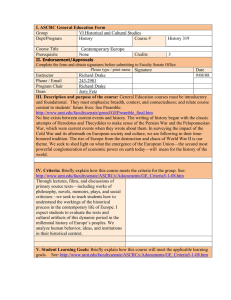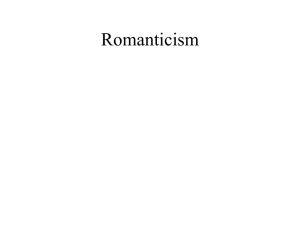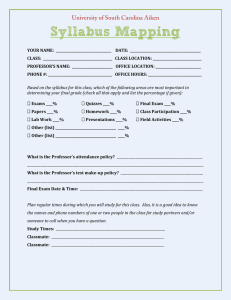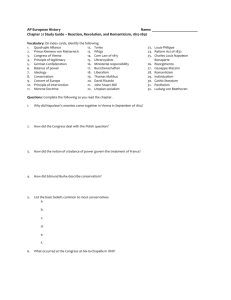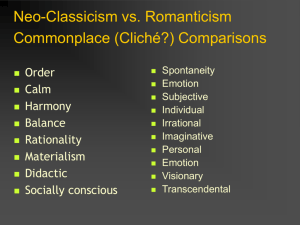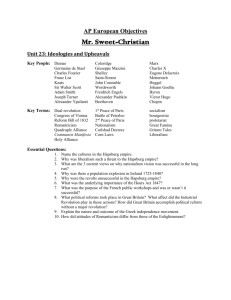I. ASCRC General Education Form Group VI Historical and Cultural Studies Dept/Program
advertisement
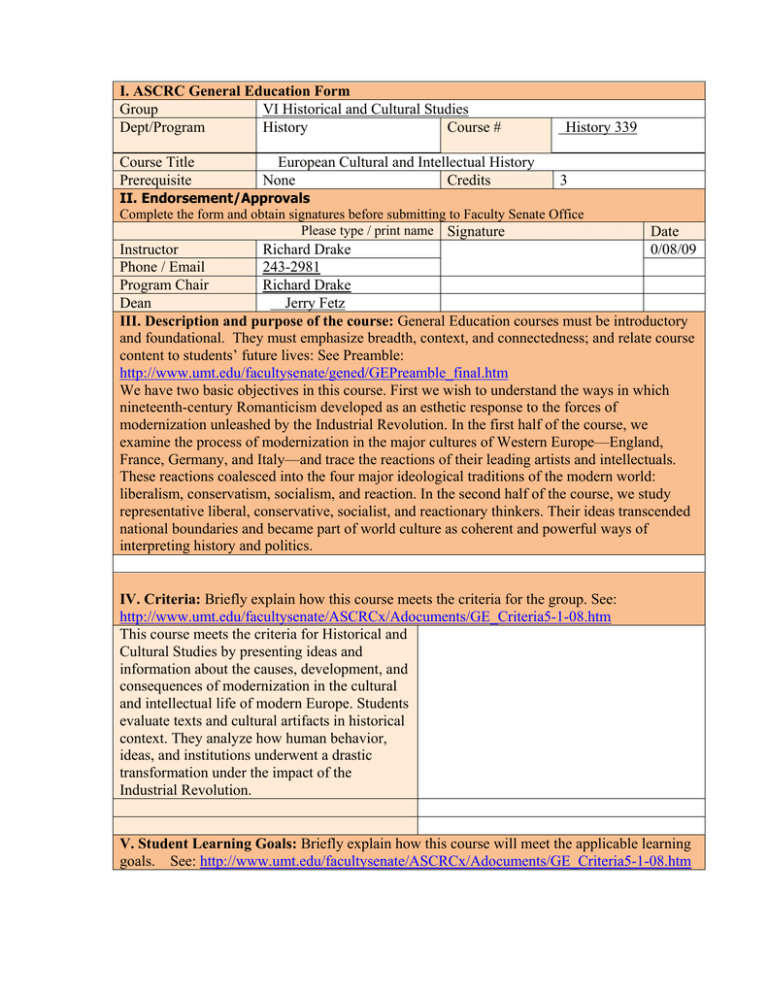
I. ASCRC General Education Form Group VI Historical and Cultural Studies Dept/Program History Course # Course Title Prerequisite European Cultural and Intellectual History None Credits History 339 3 II. Endorsement/Approvals Complete the form and obtain signatures before submitting to Faculty Senate Office Please type / print name Signature Date Instructor Richard Drake 0/08/09 Phone / Email 243-2981 Program Chair Richard Drake Dean Jerry Fetz III. Description and purpose of the course: General Education courses must be introductory and foundational. They must emphasize breadth, context, and connectedness; and relate course content to students’ future lives: See Preamble: http://www.umt.edu/facultysenate/gened/GEPreamble_final.htm We have two basic objectives in this course. First we wish to understand the ways in which nineteenth-century Romanticism developed as an esthetic response to the forces of modernization unleashed by the Industrial Revolution. In the first half of the course, we examine the process of modernization in the major cultures of Western Europe—England, France, Germany, and Italy—and trace the reactions of their leading artists and intellectuals. These reactions coalesced into the four major ideological traditions of the modern world: liberalism, conservatism, socialism, and reaction. In the second half of the course, we study representative liberal, conservative, socialist, and reactionary thinkers. Their ideas transcended national boundaries and became part of world culture as coherent and powerful ways of interpreting history and politics. IV. Criteria: Briefly explain how this course meets the criteria for the group. See: http://www.umt.edu/facultysenate/ASCRCx/Adocuments/GE_Criteria5-1-08.htm This course meets the criteria for Historical and Cultural Studies by presenting ideas and information about the causes, development, and consequences of modernization in the cultural and intellectual life of modern Europe. Students evaluate texts and cultural artifacts in historical context. They analyze how human behavior, ideas, and institutions underwent a drastic transformation under the impact of the Industrial Revolution. V. Student Learning Goals: Briefly explain how this course will meet the applicable learning goals. See: http://www.umt.edu/facultysenate/ASCRCx/Adocuments/GE_Criteria5-1-08.htm Students have an opportunity in this course to develop an understanding of the causes of modernization and its consequences in the cultural and intellectual life of nineteenthcentury Europe. They evaluate texts and cultural artifacts in historical context. VII. Syllabus: Paste syllabus below or attach and send digital copy with form. ⇓ The syllabus should clearly describe how the above criteria are satisfied. For assistance on syllabus preparation see: http://teaching.berkeley.edu/bgd/syllabus.html Fall 2008 Richard Drake Syllabus for History 339 (European Cultural and Intellectual History: The Nineteenth Century) Objectives of the Course We have two basic objectives in this course. First, we wish to understand the ways in which nineteenth-century Romanticism developed as an esthetic response to the forces of modernization unleashed by the Industrial Revolution. In the first half of the course, we examine the process of modernization in the major cultures of Western Europe—England, France, Germany, and Italy—and trace the reactions of their leading artists and intellectuals. These reactions coalesced into the four major ideological traditions of the modern world: liberalism, conservatism, socialism, and reaction. In the second half of the course, we study representative liberal, conservative, socialist, and reactionary thinkers. Their ideas transcended national boundaries and became part of world culture as coherent and powerful ways of interpreting history and politics. Required Readings William Wordsworth and Samuel Taylor Coleridge, Lyrical Ballads, second ed. (Oxford) George Eliot, Felix Holt, the Radical (Oxford) Giacomo Leopardi, Selected Poems (Princeton) Gustave Flaubert, Madame Bovary (Penguin) Johann Wolfgang Goethe, Faust, Part I (Bantam Doubleday) Henrik Ibsen, Eight Plays (Random) selections: “A Doll’s House” and “Hedda Gabler” Friedrich Engels, The Condition of the Working Class in England (Oxford) Thomas Carlyle, Past and Present (Kessinger) Friedrich Nietzsche, The Birth of Tragedy (Viking-Penguin) Copies of all or most of these books are on the Reserve Shelf of the Library under my name and the course number. Quizzes, Examinations, and Papers Students will write a midterm examination and a final examination. Both examinations will have mainly an essay format, but some short-answer questions will be asked. A ten-page term paper, to be determined by each student in consultation with the professor, will be due on Monday, 10 November. Graduate students who are taking the course for graduate credit must write a twenty-page paper in place of the ten-page assignment. Late papers will be discounted at the rate of one-third of a grade per day. Three unannounced quizzes will be given during the semester. I regard the quizzes as a barometer of the student’s ongoing performance in the course and as a means of checking attendance. Quizzes cannot be made up at a later date. Grading Policy The scores on the quizzes will count for 10 per cent of the student’s grade. The midterm examination will count for 20 per cent, the term paper for 30 per cent, and the final examination for 40 per cent. I grade students in accordance with their mastery of the course readings and lectures. I expect students to demonstrate upper-division skill at the university level in the reading of texts and the writing of essays. I set great store by students who demonstrate a capacity and eagerness for growth as readers and writers. It is the policy of the History Department not to allow changes in the grading option after the thirtieth day of instruction, which, for this semester, is Monday, 13 October. For students who take the course on a Pass/Not Pass basis, the minimum grade for a Pass is “D.” If you take an incomplete in the course, you will have one year in which to finish all requirements before the “I” becomes an “F.” As a general rule, students should take care of incompletes as soon as possible. Students who have need of the Disability Services Center should make certain that they are properly registered there. Let me know what special arrangements you will require for the examinations. I consider plagiarism in any form to be the sin against the Holy Ghost. Classroom Manners Please come to class on time. I begin lecturing at ten minutes after the hour, and I expect students to be seated by then. I ask you not to eat and drink in class because it is distracting to me and to other students. The classroom is not a bistro but a place for serious intellectual work and development. Office Hours My office hours for the semester are MWF, 10:00-11:00. I generally will be available at 2:00 on those days, after my last class. If you are free at neither of these times, please see me about making an appointment for a mutually convenient hour. You can reach me by telephone at 2981. My e-mail address is richard.drake@umontana.edu. Mandatory Public Lectures In addition to the course lectures, students will be required to attend two events in the President’s Lecture Series. Paul Mariani, University Professor of English at Boston College, will give a lecture at 8:00 P.M. on 27 October in the University Theatre, entitled “Being a Catholic Intellectual and Writer Today.” Michael Coonrod, piano faculty member at the Interlochen School, will give a lecture/recital at 8:00 P.M. on 1 December in the Music Recital Hall, entitled “Romanticism in Russia: Tchaikovsky, Scriabin, Medtner, and Rachmanivov.” For students who cannot attend because of work or family obligations, films of the lectures will be made available on the Reserve Shelf in the Mansfield Library. Lectures and Reading Assignments Week 1 M 25 August Introduction W 27 August The Age of Revolution F 29 August Romanticism and the Crisis of Modernity in England M 1 September Labor Day Holiday W 3 September Discussion of Lyrical Ballads F 5 September M 8 September The Industrial Novel: Charles Dickens W 10 September Discussion of Felix Holt, the Radical F 12 September Slide Lecture: the Pre-Raphaelites Week 2 Slide Lecture: Constable and Turner Week 3 Week 4 M 15 September Culture in a Traditional Society: Italy W 17 September Italy and the Grand Tour: Slide Lecture on the English Romantics in Rome F 19 September Italian Romanticism M 22 September Discussion of Leopardi, Selected Poems W 24 September Italian Opera in the Nineteenth Century F 26 September Slide Lecture: The Macchiaioli M 29 September Culture in an Intermediate Society: France W 1 October French Romanticism in Literature and Music F 3 October Discussion of Flaubert, Madame Bovary M 6 October Slide Lecture: Delacroix and Gericault W 8 October The Peculiarities of German History: Culture in a Society on the Eve of Modernization F 10 October German Romanticism in Literature and Music M 13 October Discussion of Goethe, Faust, Part I W 15 October Slide Lecture: Caspar David Friedrich F 17 October Review M 20 October Midterm Examination W 22 October Ideological Responses to Modernity: Liberalism, Socialism, Conservatism, and Reaction Week 5 Week 6 Week 7 Week 8 Week 9 F 24 October John Stuart Mill: Liberalism, Individualism, and Society M 27 October Charles Darwin and the Triumph of Science W 29 October Slide Lecture: Realism in Painting (Gustave Courbet to the Impressionists) F 31 October Realism in European Literature M 3 November Discussion of Ibsen, “A Doll’s House” and “Hedda Gabler” in Eight Plays W 5 November Hegelianism and the Young Karl Marx F 7 November Socialism and Modern Alienation Week 10 Week 11 Week 12 M 10 November Working Discussion of Engels, The Condition of the Class in England W 12 November The Later Marx F 14 November The Anarchist Tradition M 17 November The Conservative Tradition W 19 November F 21 November The Catholic Church as a Conservative Cultural and Intellectual Institution Week 13 Discussion of Carlyle’s Past and Present Week 14 M 24 November Kierkegaard Religious Reaction: Dostoyevsky and W 26 November Thanksgiving Holiday F 28 November Thanksgiving Holiday M 6 December Secular Reaction: Friedrich Nietzsche W 8 December Discussion of The Birth of Tragedy F 10 December Conclusions and Review Week 15 Final Examination: 1:10­3:10 Thursday, 11 December. *Please note: As an instructor of a general education course, you will be expected to provide sample assessment items and corresponding responses to the Assessment Advisory Committee.

